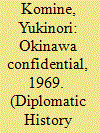| Srl | Item |
| 1 |
ID:
092074


|
|
|
|
|
| Publication |
2009.
|
| Summary/Abstract |
United States rapprochement with China should be re-examined by taking into consideration the American negotiating approach towards Beijing regarding the role of Japan, the United States' major Asian ally and China's long-term rival in East Asia. Whilst announcing the Nixon Doctrine, which increased pressure on Japan to strengthen its defense and regional responsibilities, Nixon and Kissinger used the so-called "Japan Card," Japan's possible military resurgence and China's long-term fear of it, as a tacit negotiating tool to justify to Chinese leaders the continued United States military presence in East Asia. This article examines the impact of the United States rapprochement with China on the American negotiating process with Chinese leaders for the continuation of the United States-Japan Security Treaty and to what extent it changed China's policy toward American relations with Japan.
|
|
|
|
|
|
|
|
|
|
|
|
|
|
|
|
| 2 |
ID:
131452


|
|
|
|
|
| Publication |
2013.
|
| Summary/Abstract |
This article demonstrates that during the 1969 Okinawa reversion negotiations, there were both secret agreements and disagreements between the U.S. and Japan regarding the conditions applied to the use of United States bases on Okinawa after reversion. The United States sought to preserve the unrestricted use of its bases on Okinawa for conventional combat operations in regional contingencies including Korea, Taiwan, and Indochina, as well as the emergency re-entry and transit rights of nuclear weapons. Due to the antinuclear public sentiment and fear of the entrapment into regional conflicts, Japan pursued the withdrawal of all nuclear weapons from Okinawa. While the United States insisted on making confidential written arrangements for the nuclear and base issues, Japan attempted to focus on public statements to explain mutual agreements but provided verbal private assurances. In the end, the United States and Japan agreed to maintain U.S. base functions for the continued U.S. deterrent capabilities in East Asia.
|
|
|
|
|
|
|
|
|
|
|
|
|
|
|
|